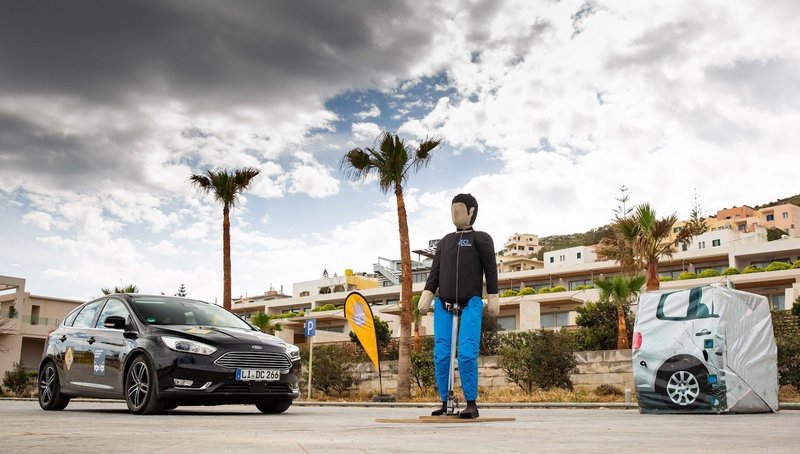The Accident Preventers
Working Toward Vision Zero with Continental Worldwide
As a strong partner of the Global NCAP worldwide information campaign “Stop the Crash”, Continental is committed to greater road safety. Recently, the company presented in India and Greece which technologies can save people’s lives – with success.
On April 11-12, 2019, the Sixth Global Meeting of Road Safety Non-Governmental Organisations (NGOs) took place in Crete under the auspices of the #StopTheCrash-Partnership. This time the focus was on the life-saving benefits of Autonomous Emergency Braking System (AEB). Over 270 participants from 76 countries participated in live demonstrations of this crash avoidance technology. Continental is one of the partner companies of the "StopTheCrash-Initiative" of the Global NCAP.
On the streets of the Indian capital of New Delhi, pure chaos seems to reign to outsiders. There is deafening honking. Cars and buses change lanes, often without indicating. They force themselves tightly between other vehicles – leaving just a few centimeters of space. Scooter riders and motorcyclists also take advantage of each tiny gap to push forward. They are often overloaded, or have too many people riding on them. Extremely few riders wear helmets. It quickly becomes clear that mobility obeys its own rules here and – unfortunately – is still much too likely to end in fatalities.
According to the most recent global status report on road safety by the World Health Organization (WHO), more than 150,000 people died on the roads in India in 2017 – which is more registered cases than in any other country. While road traffic in industrialized countries has been getting safer and safer for years – not least due to the legally stipulated use of increasingly sophisticated safety and advanced driver assistance systems – WHO is still unable to identify any significant progress in terms of road safety in most emerging and developing economies. This means, for example, that the risk of losing your life in a traffic accident in a poorer country is still more than three times as high as in an industrialized country.
Continental is active in the country
Constant population growth is resulting in a greater volume of vehicles – consequently increasing the urgency and fundamental need for mobility to be made safer, especially in poorer regions of the world. Continental, too, feels obligated to pursue this objective and has for years been committed to a world without traffic fatalities as part of its “Vision Zero”. Since 2015, Continental has also been a partner of the global information campaign “Stop the Crash” by Global NCAP (New Car Assessment Program), an international vehicle safety association. This organization, based in the United Kingdom, evaluates the safety of new vehicles and campaigns for establishing accident prevention systems and increased tire safety worldwide.
Global NCAP and its partners have, for instance, undertaken to significantly reduce the number of traffic fatalities by clarifying and introducing improved safety standards. With this objective in sight, Continental is also continuing to support campaigns under the umbrella of “Stop the Crash” in countries such as Brazil, Chile, Malaysia, Uruguay, Thailand, China and Argentina. Last year, “Stop the Crash” was launched in India – likewise with the support of Continental. In 2019, it was also launched in Greece.
While industrialized countries are clearly focused nowadays on accident prevention technologies for increasingly connected and automated mobility, people are still faced with fundamental challenges in emerging and developing economies. In many places we have to, for instance, start with measures such as introducing a general obligation to wear a helmet or seatbelt, making regular vehicle testing compulsory or standardizing safety technologies in vehicles.
Meeting the requirements of different countries
The focus of the “Stop the Crash” campaign in countries with a very high accident rate is, therefore, on technologies that have already been saving lives for years in many industrialized countries: electronic stability control (ESC), emergency brake assist (EBA) and the anti-lock brake system for motorcycles (ABS). In addition, the campaign raises awareness on having sufficiently high tire pressure and sufficient tread depth.
At special events, Continental will subsequently demonstrate the advantages that such safety technologies have in practice in the markets. In India, for example, there were demonstration drives at the former Formula 1 track near New Delhi. The Continental team presented ABS for motorcycles in the country that has a large volume of two-wheelers, making an important contribution to enhanced road safety in the future. The Indian Minister of Road Transport and Highways has announced that both ESC and ABS will be compulsory on India’s roads from 2022 onward. And that will be very good news for all those who travel daily on India’s more-than-three-million-kilometer road network.
About "Stop the Crash"
“Stop the Crash” is a multi-stakeholder partnership led by Global NCAP (New Car Assessment Program), a vehicle safety association committed to the global use of life-saving accident prevention technologies. Continental has been a partner of the “Stop the Crash” campaign since 2015.
